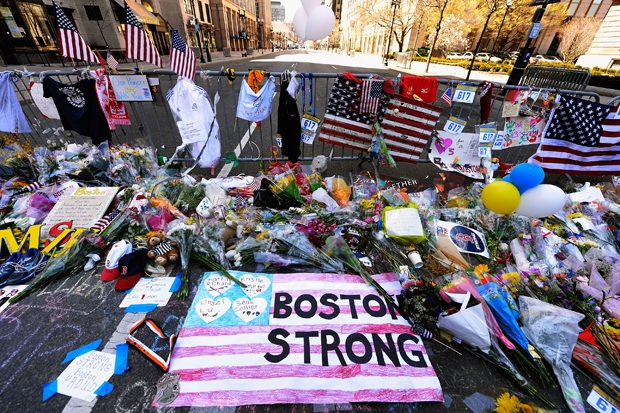As Masha Gessen herself admits — and as friends and journalist colleagues repeatedly told her — it was a strange choice to write this book. But you only have to get a few pages in to realise that Gessen, the author of a bestselling analysis of Putin, is ideally placed to take on the story behind the Boston marathon bombers. And she is the perfect person to situate it in the wider context of ‘the war on terror’ in a way that illuminates and inspires. This is quite simply a remarkable piece of old-school journalism.
On 15 April 2013 two homemade bombs exploded near the finish line of the Boston marathon, killing three people and wounding 264 others. Two brothers, immediately identified as ‘Chechens’ (not strictly speaking true: they were American citizens), were implicated. In the ensuing manhunt, the eldest, Tamerlan Tsarnaev, was killed. Last month Dzokhar was sentenced to death in a Boston court.
Gessen takes the story back a generation, travelling across the US and the former Soviet Union to interview family members, friends and colleagues. She draws a picture of an unavoidably fragmented group of people. The Tsarnaevs’ parents come from an eternally persecuted part of Soviet Russia: entire swathes of the Caucasus were deported during the Stalinist era. Gessen very carefully recounts the wider history of the area and the mentality of the people who had to live through all this during the 20th century in order to plant a seed in the reader’s mind: identity is extremely complicated.
Her purpose in doing this is to question whether the Tsarnaevs were ‘radicalised’ by some kind of Chechen branch of al-Qaeda or similar. Or it’s at the very least to introduce some shades of grey into that narrative. Gessen is meticulously objective, but she’s able to show that just as it is possible to paint the two brothers as ‘Muslim radicals’, it would also be possible to depict them as ‘ordinary American citizens’. The second option is, of course, far more terrifying than the first. In the Guantánamo-era mentality, the first seems containable. The second does not.
The Tsarnaevs had been living in Boston for over ten years when the bombings took place. The family retained close ties with friends and relatives in ‘the old country’, but Gessen contends that it’s really impossible to say whether they identified as Chechen or Russian or Dagestani. They had links to all these places, as well as to Kyrgyzstan and Kazakhstan. Again, not very convenient if you are trying to portray someone as a radical who has had terrorist training in a specific place. Certainly Tamerlan had travelled to Chechnya shortly before the Boston marathon but, according to Gessen, it seems more likely that he radicalised the people he met there rather than the other way round. (Some acquaintances of his later became involved in an incident where the American flag was burned.)
The strength and difficulty of this kind of journalism is that it is not judge and jury and it does not draw fixed conclusions. Gessen does not know precisely whether the Tsarnaev brothers were responsible for the Boston bombings (although she states that she is taking it as read that they were). But she is not stating either that it is likely that they are innocent. She is simply examining the context. And the context is as fascinating as it is complex. Gessen does not look for excuses or blame but she seeks — relentlessly, good-humouredly and with all the insight she brings as a Russian raised in the US — to explain.
As immigrants to the US, the Tsarnaevs led an extremely difficult life, never really sure where money was coming from and what opportunities were available to them. Meanwhile, their children grew up believing what they were told: that there were ‘so many opportunities’ in the US. And yet these never seemed to materialise. Dzokhar was a low-level pot-dealer at university. Tamerlan was mostly aimless. Is this enough to make you into a terrorist if you become really annoyed about US foreign policy? Gessen seems to argue that possibly it is. Although at the same time she seems to want us to draw the opposite conclusion: can it really be possible that two fairly ordinary people would commit such a crime with very little motive? This is an utterly gripping book, both challenging and illuminating.






Comments